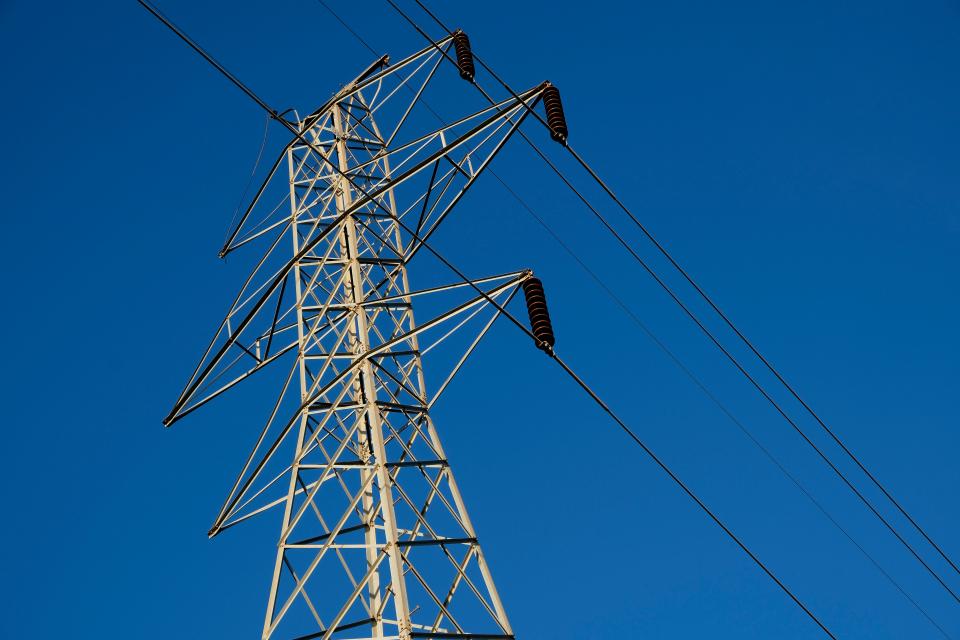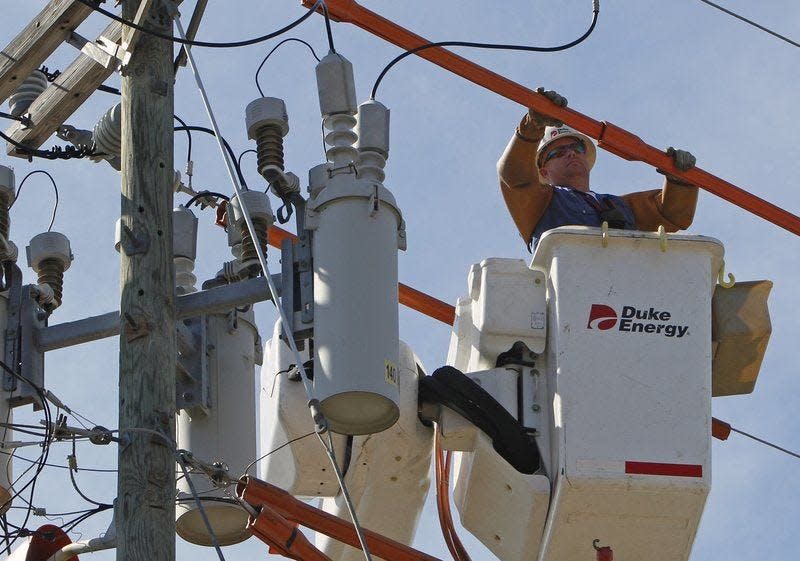Indiana may experience rolling blackouts this summer. What are they? How can you prepare?
Hoosiers may need to find other ways to cool off this summer besides fans and air conditioners if extreme energy usage spikes tap out the power grid.
The Midwest is likely to put its power grid under stress and, at worst, experience power outages over the next few months, according to a new North American Electric Reliability Corp. report. The energy grid may struggle to meet demand as people crank up their air-conditioning units and use more power when temperatures rise.
However, utility companies say blackouts are a worst case scenario, only a small possibility and not a reason to panic.
What is a rolling blackout?
A rolling blackout is when utility companies temporarily turn off power for specific areas. This is necessary as a last resort to manage supply and demand imbalances in the power grid.
By strategic planning, an outage many affect one area for a certain amount of time and later shifts to a different area. Hence, it is "rolling" because the outage rotates. Hospitals and other power-sensitive areas are protected during rolling blackouts.

Rolling blackouts prevent grid infrastructure overloads and serious damage. Pushing the grid could result in a total shutdown, causing everyone to be without power.
Why could rolling blackouts happen here, and why now?
The report said the power grid much of the Midwest relies on is "in high risk of energy emergencies during peak summer conditions."
Most of Indiana is in that energy grid, which stretches into 15 states and one Canadian providence. The Midcontinent Independent System Operator, or MISO, is the organization in charge of controlling and operating the grid serving 42 million people. Parts of Indiana, including South Bend and Muncie, are under PJM Interconnection, a power grid under much less stress. Bloomington falls into the MISO-dominated majority.

MISO lost about 2% of its generation capacity within the past year. Why? Fossil-fueled plants were retired to make way for new, cleaner energy sources. A key transmission line was also shut down for maintenance after tornado damage.
More news: Seeking a primary-care doctor in Bloomington? Few taking new patients and the wait is long
Other areas of the country also are experiencing electricity shortages due to drought, supply chain issues and wildfires.
However, apart from this summer's blackouts, Sanya Carley, Indiana University professor and energy policy researcher, said people need to remember there are millions of people who are energy insecure and struggle with the effects. Energy insecure households are unable to provide for their energy needs or they are disconnected from the grid.
How likely are blackouts in Indiana?
A last, "extremely rare" step to protect the electric grid is rolling blackouts, MISO spokesperson Brandon D. Morris said in an email statement. It has never been a need in Indiana, he said.
The high risk alert is not cause for panic, he said, and it does not mean power will go out. More likely, Morris said, MISO will have to implement emergency operating procedures to regulate surges of energy use. MISO also has access to significant energy imports from PJM, he said.
What can I do to prepare for extreme heat in Indiana?
Temperatures are projected to be higher this summer in many parts of the country, including Indiana, according to the National Oceanic and Atmospheric Administration.
Here are some ways people can stay safe in extreme heat without power:
Drink lots of water.
Wear loose fitting and lightweight clothes.
Open windows at night.
Keep the fridge and and freezer closed to preserve food.
Check your carbon monoxide detector.
Sit in a car's AC to cool down as a temporary solution.
Additionally, people should consider their pet's body temperature during heat waves.
Beat the heat: Here's where you can go to swim, cool off for the summer in Monroe County
People who can prepare for blackouts are often the most advantaged, Carley said. While some may have other places to go and are able to buy generators, she said millions of people, including many in Indiana, don't have that luxury. Tapping into a community network is important if the power is out for an extended period, Carley said.
"Older people and very young people are more at risk of being severely compromised from extreme heat and extreme cold temperatures," Carley said. "Those really are the vulnerable populations that need to be the most concerned and the most mindful of finding other help."
People can go to community areas, like a mall, where they can access AC, she said. Government and local nonprofits may also create areas for people to get out of the heat, if necessary, she said.
People can coordinate with their neighbors as well to prevent loss of perishables. Based on her research, Carley said disconnected households can lose their entire fridge of food, a loss of at least $300.
People who rely on electronic medical devices may not be able to power them, Carley said. She recommends people talk to their doctor about their electric appliances and what to do if there isn't power. Battery-powered or rechargeable alternatives may be an option.
"When you don't have access to power, it's really hard to keep your body at a comfortable temperature," Carley said. "If you're overheated, especially if you have another preexisting medical condition, it could be life threatening."
Cate Charron is an intern at The Herald-Times. You can reach her over email at ccharron@heraldt.com or on Twitter at @CateCharron.
This article originally appeared on The Herald-Times: Indiana utility companies: Rolling blackouts are worst-case scenario
